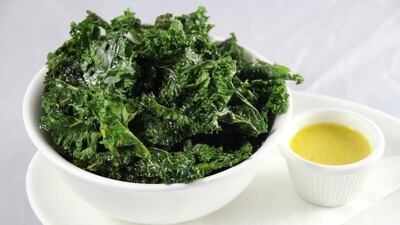Kale. I’m thinking about kale. At this time of year, after all, things like kale are at the top of the “this year I’ll do better” lists that proliferate at the new year. You know those lists, right? Those start-the-new-year-right lists that by late February have often faded to little more than guilt-inducing bullet points?
Every year I resolve not to make such a list, and then every year I feel compelled to do so, spurred by friends extolling their aims for the new year and by newspapers and magazines issuing their “10 best” and “top 15” and “best of …”
It's a contradictory impulse, this new year's resolution thing: on the one hand, self-help experts tell us to love ourselves as we are, and on the other hand, we're supposed to use the beginning of the year as an impetus for improvements. Admit it: don't you feel the temptation, confronted by the tabula rasa of the new year, to resolve that this year you will clean out the cupboards, lose the extra kilograms, finish writing the novel, learn the piano? We tell ourselves that starting January 1, our children will have more patient parents, our spouses more compassionate partners, our friends more reliable companions. We will look up from our electronic devices at least once an hour; we will obey speed limits (or at least slow down as we pass the speed cameras); we'll drink fewer soft drinks and eat less junk food.
Which brings us back to kale. Kale, my friends, is an advanced vegetable. It’s not your starter veg, like a pea or a carrot, and it’s much more difficult than the intermediate greens, like broccoli or green beans. Kale is serious stuff. Kale is Olympic vegetable-eating. Eating kale makes it clear that you’re not messing around when it comes to resolutions about nutrition.
Now, as it happens, I like kale. Really, I do. So a kale-based resolution is pretty easy for me. But the problem with these beginning-of-year lists: people – or at least I – have made lists that would task the patience of a saint or require a wrinkle in the time-space continuum to complete. My older son tells me that there’s nothing wrong with resolutions, as long as they are “measurable” and “objective”. He says that’s why “be nice to the younger brother” doesn’t work as a goal: apparently such behaviours are not objectively measurable. But if I follow his advice, I need a set of objective measurements to reduce my waistline. Maybe it’s as simple as inverting the proportion of kale to cookies in my diet: let’s call it the kale-to-cookies index for weight loss.
Does the urge to create lists for personal improvement come out of some innate hope that humans are perfectible creatures? It’s clear that we’re fallible: we need only to look at the state of the world to know the truth of that statement. But perhaps asking if we can perfect ourselves is the wrong question. What if, instead, as we lurch into the new year, we asked ourselves, how we might make the world a better place, even in some small way?
I’m not spending New Year’s Day telling myself to “be the change I hope to see in the world”, a comment often attributed to Gandhi (despite there being no documentary proof of him saying these words).
I’m not that important: no change in myself will cause the world to follow in my footsteps. No, I’m thinking about what I can do that will have an impact, even in a tiny way, outside myself. Can I tutor people, help clean up a beach, gather clothes and toys for refugee children?
My list of how to help isn’t finished yet, but I’ll tell you, it feels better to start the new year thinking about this list than thinking about how to organise my cupboards. As for kale? That’s what I’m having for dinner. Let me know if you’d like the recipe.
Deborah Lindsay Williams is a professor of literature at NYU Abu Dhabi

